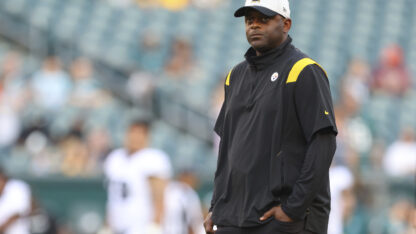Four days before the biggest game of their lives, dozens of six and seven-year-olds wearing full pads and Kelly green jerseys bounded onto a practice field in suburban Atlanta.
Under bright lights last fall, the Buford Webb football team performed tackling drills and ran sprints. Players reviewed concepts such as how to fill a C-gap — all in preparation for the Gwinnett Football League championship game that Saturday. Winning would represent a proud achievement in Gwinnett County, where over 3,200 children ages 6-15 took part in the GFL’s 2023 football season.
Increasingly, evidence points to the dangers of repetitive hits through contact sports. A recent Boston University study found that young athletes are at risk of developing chronic traumatic encephalopathy, a degenerative brain disease associated with repeated blows to the head. Those who played football for many years were more likely to be diagnosed, the study found.
In Buford and Gwinnett County, parents, coaches and league administrators acknowledge playing football comes with risks. They’ve attempted to mitigate them. But they’ve determined the joys and rituals are worth preserving.
A J McDonald participated in the GFL from ages 7-13 and works today as an attorney. Playing football caused him to experience headaches as a kid. He suffered “probably three” concussions in his career.
McDonald wouldn’t have reservations if his son, born in July, followed in his father’s footsteps.
“It’s a special bond — there’s nothing like a football bond. I’m friends with kids that I played with on my 8-year-old team.” McDonald said.
Buford, a town of 16,800 residents that’s an hour’s drive north of Atlanta, excels at producing football talent, according to a Capital News Service analysis of the five most prominent college conferences.
During the 2023 season, 23 Power Five college football players were from Buford, the analysis found. In all, Buford produced more Power Five players than 12 states and Washington, D.C.
Buford’s success begins with a robust youth sports culture. With nearly 400 players, the Buford Youth Football Association is the largest of 20 Gwinnett County organizations that form the GFL.
Games and practices are held at Buford Youth Sports Complex, which is set to undergo an estimated $1.5 million renovation to its lighting system and synthetic turf fields, according to Ken Burge, a third-generation Buford resident and football director of the Buford Youth Football Association.
To many in Buford and the GFL, football is not just a sport. “I look at football as an opportunity to really build life skills … accountability, respect, team building,” said Buford Webb coach Markell Webb, whose 7-year-old son Micáias, played on the team in the 2023 season. They argue that football’s unique elements — the way players play through adverse weather and hit each other — offer lessons that other sports cannot.
“If you can make it through football and play football, you can do anything in the world,” said Gerald “Boo” Mitchell, president of the GFL
Buford Webb called one of its final practices before the GFL championship “Competition Tuesday.” For much of the 90-minute session, shoulder pads and helmets clacked and thwacked.
Mitchell said despite the hits, youth practices look different than in the past, part of the GFL’s attempts to make the sport safer. Full-contact practices are limited to twice a week.
“We love to see how football used to be played … but you have to understand that the game has changed,” said Keybo Taylor, a former GFL coach who today serves as the sheriff of Gwinnett County.
Even as youth teams in Buford and the GFL try to mitigate the risks of football, there is a perception that dangers are overstated, especially for younger kids.
“At this age, they don’t hit hard enough,” said Jimmy Williams, whose 7-year-old son, Christopher, played this season for Buford Webb. “It’s all fun.”
At the end of a long season, Buford Webb won the GFL title, defeating Lawrenceville, 24-6 on Nov. 11. Players received championship rings and were featured in the Gwinnett Daily Post.
“They feel like local celebrities,” Webb said.
The GFL is now in the offseason, but football in Buford goes on. Parents pay for kids to work out with trainers. Children compete throughout the year.
“This is a 365-day-a-year football community,” Mitchell said. “It never stops.”










